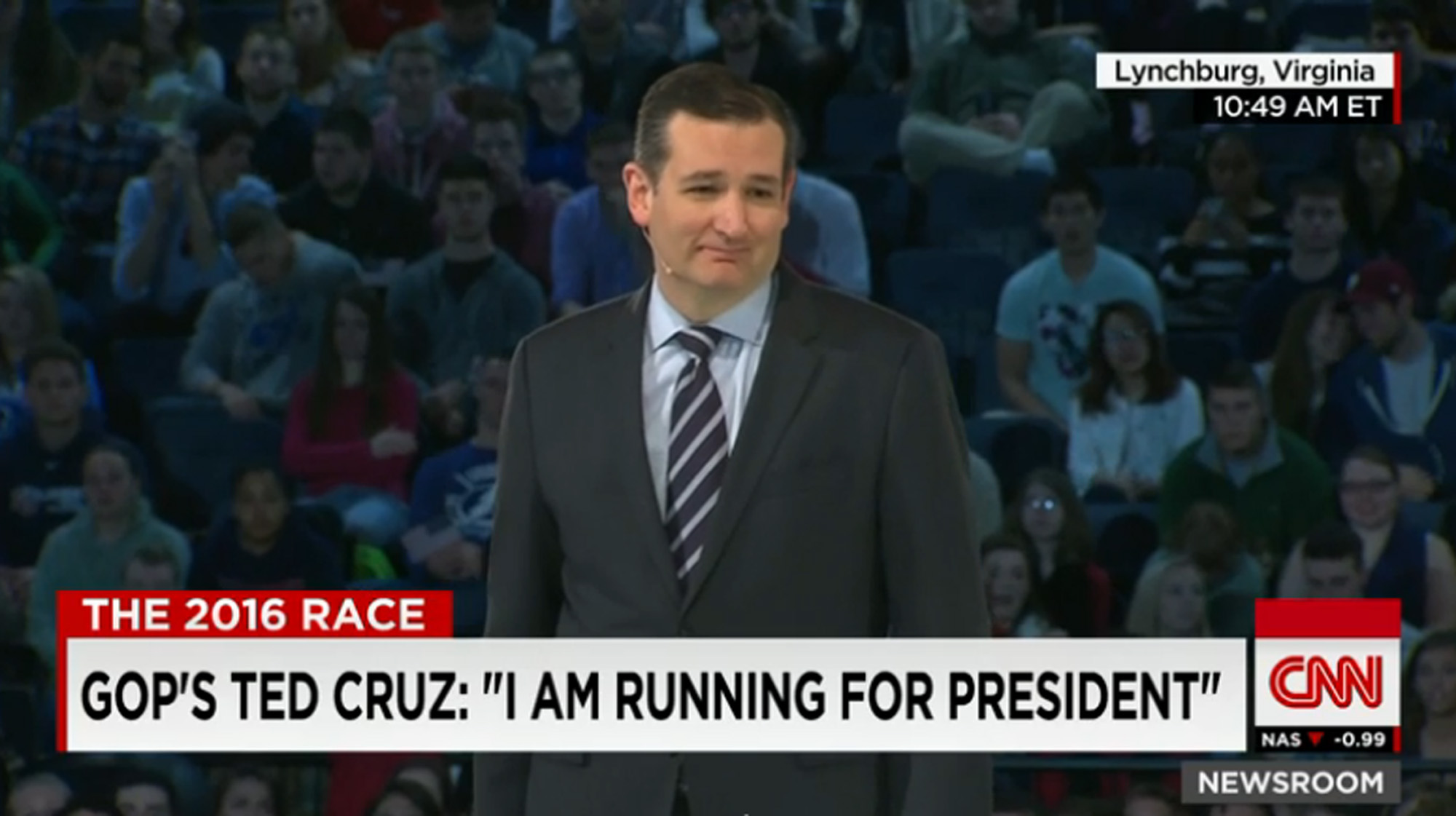
NASHVILLE (BP) — With Ted Cruz becoming the first Republican to officially announce his candidacy for the White House in 2016, social conservatives are beginning to assess potential candidates’ stands on abortion, gay marriage and other social issues.
Cruz, a first-term senator from Texas, announced his candidacy March 23 by tweeting, “I’m running for president and I hope to earn your support!” He launched his campaign with a speech at Liberty University, the Christian school founded by the late Jerry Falwell. In the speech, Cruz “signaled that he will cast himself as a principled social conservative and align himself with the evangelical voters who play a critical role in the early primary states,” Politico reported.
Other potential Republican presidential candidates include, alphabetically, Jeb Bush, Ben Carson, Chris Christie, Mike Huckabee, Rand Paul, Rick Perry, Marco Rubio, Rick Santorum and Scott Walker.
Cruz, a member of First Baptist Church in Houston, told his audience at Liberty, “I believe God isn’t done with America yet.”
Cruz has introduced a bill in the U.S. Senate that would allow states to define marriage as only between a man and a woman. As solicitor general of Texas, he successfully helped defend a federal ban on partial birth abortion before the U.S. Supreme Court and successfully defended a Texas law prohibiting groups that provide abortions from receiving state funds, according to Cruz’s website.
Among the positions of other candidates on traditional pro-family issues:
— Bush, former governor of Florida, supported a federal constitutional amendment banning same-sex marriage a decade ago but drew criticism from some social conservatives more recently for seeming to soften his stance on gay marriage and hiring high-level advisers who are either homosexual or gay-affirming, according to MSNBC.com. Buzzfeed’s McKay Coppins called Bush “2016’s Gay-Friendly Republican.”
As governor, Bush signed pro-life legislation including a bill that attempted to save the life of a paralyzed woman named Terri Schiavo when her husband sought to have food and water withheld. Bush converted to Roman Catholicism 20 years ago and continues to practice his faith, The New York Times reported.
— Carson, former director of the pediatric neurosurgery division at Johns Hopkins Hospital, opposes same-sex marriage and abortion. He has criticized abortion advocates for characterizing pro-lifers as waging a “war on women,” according to LifeNews.com. “The war is on their babies,” Carson, a Seventh-day Adventist, said.
— Christie, governor of New Jersey, opposes abortion and same-sex marriage. However, in 2013 he dropped his appeal of a court decision legalizing gay marriage in New Jersey. Also in 2013, Christie signed a bill banning state-licensed counselors from trying to help children under 18 reduce or eliminate same-sex attraction.
Christie, a Roman Catholic, does not believe being homosexual is a sin or a choice, Religion News Service reported in 2013.
— Huckabee, former governor of Arkansas, has pastored Southern Baptist churches in Arkansas and served as president of the Arkansas Baptist State Convention. He is a former student at Southwestern Baptist Theological Seminary in Texas. Huckabee opposes abortion and same-sex marriage.
— Paul, a libertarian-leaning first-term senator from Kentucky, opposes same-sex marriage but says the issue should be settled by state governments rather than the federal government, the Washington Post reported. The GOP ought to “agree to disagree” on issues like gay marriage to welcome a broader coalition into the party, Paul said according to the Post.
Paul introduced a bill in the Senate that would declare a fertilized egg a human protected by law, but he told a University of Chicago forum his personal belief that “life begins at the very beginning” does not reflect the views of many Americans. Paul is a Presbyterian.
— Perry, former governor of Texas, supported a Texas constitutional amendment defining marriage as “only a union between a man and a woman,” but in 2011 he affirmed New York’s right under the Tenth Amendment to legalize same-sex marriage. Perry was a United Methodist until he began attending a non-denominational evangelical church in 2010.
— Rubio, a first-term senator from Florida, defends states’ right to define marriage as between one man and one woman and believes “the right to life outweighs the right to choose an abortion,” National Review reported in 2014.
Rubio has drawn criticism for identifying himself at times as Roman Catholic and at times as evangelical. In 2010, The New York Times published an article on his denominational affiliation titled “Marco Rubio: Catholic or Protestant?” Rubio has been a regular attendee of Christ Fellowship, a Southern Baptist church in Miami.
— Santorum, a former senator from Pennsylvania, is pro-life and opposes same-sex marriage. Santorum is a Roman Catholic.
— Walker, governor of Wisconsin, is the son of a Baptist pastor. He told attendees at the National Religious Broadcasters convention in February he supports “strong marriages” and seeks to protect innocent life, according to an NRB news release.
As governor, Walker signed a bill requiring women seeking abortions to view ultrasound images of their babies. He opposes abortion even in cases of rape and incest and has defended Wisconsin’s ban of same-sex marriage, Milwaukee’s Journal Sentinel reported in October.
















